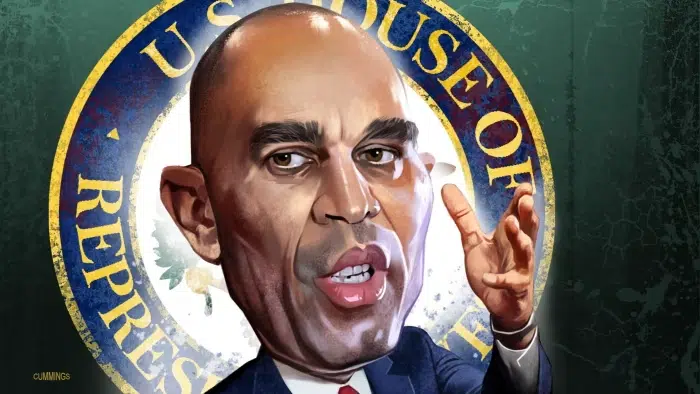
A Primer On Impoundment, From One Of Trump’s Incoming Budget Superstars
You might not have heard of Mark Paoletta, but he was nearly a household name.
Paoletta, who has spent the past four years as a legal counsel for the Center for Renewing America, an organization headed by former and soon-to-be-again Office of Management and Budget chief Ross Vought, was in the conversation for the job of Attorney General in the Trump administration. Instead, he’s been nominated as the General Counsel for OMB.
Paoletta is going to be the point man for the legal fight coming when Vought, together with Elon Musk and Vivek Ramaswamy and the other folks at the Department of Governmental Efficiency, runs through the federal budget with a meat cleaver and chops away all of the idiotic waste, fraud and abuse in there. The federal budget is rife with less-than-needful things, and there is low-hanging fruit in every department which needs to be done away with.
There are two avenues to get rid of the trash in the budget. The most conventional way of going about this is to scrub that stuff from the official budget which passes through Congress. That’s straightforward, but it’s also very difficult because Congress hasn’t passed an actual budget this century. Instead, Congress passes continuing resolutions which fund the government based on, essentially, the previous year’s budget. The reason there is so little effort at stopping the waste, fraud and abuse in Washington is that the process by which that effort could be made is broken.
Mike Johnson has sworn that as House Speaker he will return the budget to regular order, and we’re all praying for him in that quest. Whether he can do it, and how long it’ll take him, are open questions.
But the other way to make it happen is something which isn’t strictly legal at the moment: namely, impoundment.
Historically, the President has had the power to not spend money appropriated by Congress – either because he disagrees with its purpose or because he can accomplish that purpose for less than Congress allocated to it. But in 1974, in the aftermath of Watergate, Congress passed a law that greatly curtailed presidential impoundment powers, and of course our federal budget, deficits and national debt have since grown to ruinous sizes.
Paoletta is saying that 1974 law won’t stand up to a challenge, and when Roll Call ran an op-ed poo-pooing the idea that the incoming Trump administration would bring back impoundment as a means of restoring some fiscal sanity in Washington, he dropped an X post for the ages taking the writer of the Roll Call piece to task.
We thought we’d share the whole thing with you, as it’s a preview of a fascinating legal debate and exercise in American civics we’re going to see play out in real time starting next month.
The X post…
And Paoletta’s statement in full…
This @RollCall piece is so fundamentally dishonest it does not even have the integrity to link directly to TWO exhaustive @amrenewctr papers setting forth many examples of Presidents IMPOUNDING funds – including Jefferson, Grant, Harding, Hoover, FDR, Truman, Eisenhower, Kennedy, LBJ. Do those names ring a bell?
Presidents have impounded billions of dollars of funds, EVEN with appropriations language that MANDATED that it be spent on certain projects. For example, in 1896, President Cleveland’s Attorney General, Judson Harmon, issued an opinion stating in response to a question about whether appropriations language stating that funds “shall be expended” on certain a project was mandatory, wrote: “The direction to expend the sums mentioned in the proviso is, in my opinion, not mandatory to the extent that you are bound to expend the full amount if the work can be done for less.” This simply reflected the longstanding view that the Executive was not bound to expend the full amount of an appropriation, even if the appropriation used mandatory language.
Professor Bagley is dishonest when he claims that Presidents do not have the ability to impound funds and that it’s “outlandish” to claim otherwise. The only thing outlandish is Bagley’s ahistorical claim that Presidents have not vigorously employed the impoundment power in an unbroken chain of practice dating to the Founding. Here is a just one notable example from one of the two extensive CRA papers I co-authored, involving Truman impounding $735 million in defense spending, one of his many impoundments:
“The President signed the bill, but only after announcing that he directed the Secretary of Defense to place the extra $735 million for the 10 excess [Air Force] groups into reserve. He justified this ‘impoundment on the need to maintain a balance between national security and a sound economy, the importance of preserving the elements of a unified strategic concept among the military services, and the President’s authority as Commander-in-Chief.’ The President made clear that impoundment is ‘the discretionary power of the President. If he doesn’t feel like the money should be spent, I don’t think he can be forced to spend it.’”
The 1838 Supreme Court case (Kendall) “cited” by Professor Bagley was not an impoundment case. It was a private bill that ordered the postmaster general to pay a contractor money for work done. That’s it. It was never referred to as an impoundment case, as the Court made clear two years later in the case of Decatur v. Paulding, which held that the President has broad authority to determine how much of a fund appropriated by Congress ought to be paid out.
Thus, contrary to the assertions in this article, the Supreme Court has never ruled against the constitutionally of impoundment, and no court has ever ruled on the constitutionality Impoundment Control Act.
Why are we taking on this 1974 law? Because it is one of the main reasons federal spending is out of control. This law makes a mockery of the constitutional order and by purporting to make it illegal for a President to spend less than the full amount appropriated even if he can accomplish a project for less money. Under the ICA, if Congress appropriates $100 million to build a tank, and the President and his team work hard to save the taxpayer money by building it for $75 million, he is violating the ICA if he does not spend the remaining $25 million.
The ICA made an appropriation a FLOOR on spending rather than a CEILING. This turned our history of appropriations and spending on its head. The ICA has been a Congressional power grab and unconstitutional invasion into the President’s ability to carry out his executive functions.
With these unconstitutional restrictions in place since 1974, no wonder the federal debt has ballooned to $36 trillion. It’s time to end another one of these Watergate era laws (like the Independent Counsel Statute of 1978) that has undermined the separation of powers and weakened any incentives to keep the deficit under control and act as a responsible steward of the taxpayer’s dollars.



